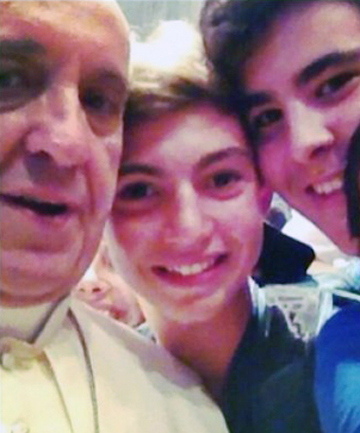Pew Research Center surveys show that half of Millennials (50%) now describe themselves as political independents and about three-in-ten (29%) say they are not affiliated with any religion. These are at or near the highest levels of political and religious disaffiliation recorded for any generation in the quarter-century that the Pew Research Center has been polling on these topics.
At the same time, however, Millennials stand out for voting heavily Democratic and for liberal views on many political and social issues, ranging from a belief in an activist government to support for same-sex marriage and marijuana legalization.
 |
| Papal Selfie |
The median age at first marriage in the US is going up to 27 for women and 29 for men, partly because the Millennial generation has the highest rate of educational attainment, but also the highest rate of student debt, at a time when America is still recovering from the 2007-2009 recession.
The Millennial generation are less likely than older generations to be affiliated with any religion, they are also less likely to say they believe in God. A solid majority still do—86%—but only 58% say they are “absolutely certain” that God exists, a lower share than among older adults, according to a 2012 survey by the Pew Research Center’s Religion & Public Life Project.
 |
| 51% of Millennials support gay rights, while only 36% call themselves a religious person |
While in the majority of people under 33 in America claim to believe in god, a growing number of those are unwilling to identify with any religious institution. Only 36% of Millennials call themselves a religious person, while 51% support gay rights.
The support for same sex marriage has seen a substantial generational surge. A recent report by the Public Religion Research Institute shows that 69% of Millennials support allowing gay and lesbian people to legally marry. The report finds that religious groups are "alienating young adults by being too judgmental on gay and lesbian issues."
The number of people with close gay friends has nearly tripled in 20 years:
Nearly two-thirds (65%) of Americans report having a close friend or family member who is gay or lesbian, nearly three times the number (22%) who reported having such a relationship in 1993. Americans who have a close friend or family member who is gay or lesbian are 27 points more likely than those who do not to favor allowing gay and lesbian couples to legally marry (63% vs. 36%). This “family and friends” effect is present across all major demographic, religious and political groups.The majority of churchgoers avoid talking about LGBT issues in church, believing that the majority of their fellow congregants are opposed to same sex marriage while the majority support it. The views of bishops are not representative of their church members.
Among Millennials who no longer identify with their childhood religion, nearly one-third say that negative teachings about, or treatment of, gay and lesbian people was either a somewhat important (17%) or very important (14%) factor in their disaffiliation from religion.
Regular churchgoers (those who attend at least once or twice a month), particularly those who belong to religious groups that are supportive of same-sex marriage, are likely to over- estimate opposition for same-sex marriage in their churches by 20 percentage points or more...
About 6-in-10 (59%) white mainline Protestants believe their fellow congregants are mostly opposed to same-sex marriage. However, among white mainline Protestants who attend church regularly, only 36% oppose allowing gay and lesbian people to legally marry while a majority (57%) actually favor this policy.
Roughly three-quarters (73%) of Catholics believe that most of their fellow congregants are opposed to same-sex marriage. However, Catholics who regularly attend church are in fact divided on the issue (50% favor, 45% oppose).

No comments:
Post a Comment